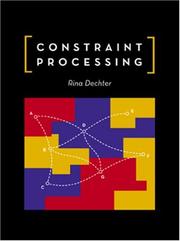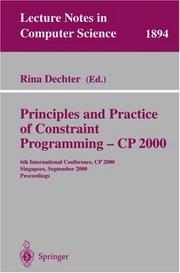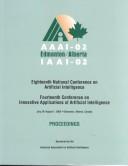| Listing 1 - 10 of 11 | << page >> |
Sort by
|
Book
ISBN: 9781627051972 9781627051989 Year: 2013 Publisher: San Rafael, California (1537 Fourth Street, San Rafael, CA 94901 USA) Morgan & Claypool
Abstract | Keywords | Export | Availability | Bookmark
 Loading...
Loading...Choose an application
- Reference Manager
- EndNote
- RefWorks (Direct export to RefWorks)
681.3*I2 --- 681.3*I2 Artificial intelligence. AI --- Artificial intelligence. AI

ISBN: 9781558608900 1558608907 0080502954 9780080502953 1281072958 9781281072955 9786611072957 6611072950 Year: 2003 Publisher: San Francisco Morgan Kaufmann Publishers
Abstract | Keywords | Export | Availability | Bookmark
 Loading...
Loading...Choose an application
- Reference Manager
- EndNote
- RefWorks (Direct export to RefWorks)
Constraint satisfaction is a simple but powerful tool. Constraints identify the impossible and reduce the realm of possibilities to effectively focus on the possible, allowing for a natural declarative formulation of what must be satisfied, without expressing how. The field of constraint reasoning has matured over the last three decades with contributions from a diverse community of researchers in artificial intelligence, databases and programming languages, operations research, management science, and applied mathematics. Today, constraint problems are used to model cognitive tasks in vision,
Book
ISBN: 9781681734910 9781681734927 9781681734903 Year: 2019 Publisher: [San Rafael, California] Morgan & Claypool
Abstract | Keywords | Export | Availability | Bookmark
 Loading...
Loading...Choose an application
- Reference Manager
- EndNote
- RefWorks (Direct export to RefWorks)
Book
Year: 1986 Publisher: Los Angeles University of California press
Abstract | Keywords | Export | Availability | Bookmark
 Loading...
Loading...Choose an application
- Reference Manager
- EndNote
- RefWorks (Direct export to RefWorks)

ISBN: 3540410538 9783540410539 3540453490 Year: 2000 Volume: 1894 Publisher: Berlin, Heidelberg : Springer Berlin Heidelberg : Imprint: Springer,
Abstract | Keywords | Export | Availability | Bookmark
 Loading...
Loading...Choose an application
- Reference Manager
- EndNote
- RefWorks (Direct export to RefWorks)
Constraint programming (Computer science) --- Computer Science --- Engineering & Applied Sciences --- Computer science. --- Computer programming. --- Programming languages (Electronic computers). --- Computer logic. --- Mathematical logic. --- Artificial intelligence. --- Computer Science. --- Programming Languages, Compilers, Interpreters. --- Artificial Intelligence (incl. Robotics). --- Programming Techniques. --- Logics and Meanings of Programs. --- Mathematical Logic and Formal Languages. --- Logic design. --- Artificial Intelligence. --- Design, Logic --- Design of logic systems --- Digital electronics --- Electronic circuit design --- Logic circuits --- Machine theory --- Switching theory --- AI (Artificial intelligence) --- Artificial thinking --- Electronic brains --- Intellectronics --- Intelligence, Artificial --- Intelligent machines --- Machine intelligence --- Thinking, Artificial --- Bionics --- Cognitive science --- Digital computer simulation --- Electronic data processing --- Logic machines --- Self-organizing systems --- Simulation methods --- Fifth generation computers --- Neural computers --- Informatics --- Science --- Algebra of logic --- Logic, Universal --- Mathematical logic --- Symbolic and mathematical logic --- Symbolic logic --- Mathematics --- Algebra, Abstract --- Metamathematics --- Set theory --- Syllogism --- Computer science logic --- Logic, Symbolic and mathematical --- Computers --- Electronic computer programming --- Electronic digital computers --- Programming (Electronic computers) --- Coding theory --- Computer languages --- Computer program languages --- Computer programming languages --- Machine language --- Languages, Artificial --- Programming --- Constraint programming (Computer science) - Congresses
Book
ISBN: 1450395899 Year: 2022 Publisher: San Rafael : Morgan & Claypool Publishers,
Abstract | Keywords | Export | Availability | Bookmark
 Loading...
Loading...Choose an application
- Reference Manager
- EndNote
- RefWorks (Direct export to RefWorks)
Professor Judea Pearl won the 2011 Turing Award "for fundamental contributions to artificial intelligence through the development of a calculus for probabilistic and causal reasoning." This book contains the original articles that led to the award, as well as other seminal works, divided into four parts: heuristic search, probabilistic reasoning, causality, first period (1988-2001), and causality, recent period (2002-2020). Each of these parts starts with an introduction written by Judea Pearl. The volume also contains original, contributed articles by leading researchers that analyze, extend, or assess the influence of Pearl's work in different fields: from AI, Machine Learning, and Statistics to Cognitive Science, Philosophy, and the Social Sciences. The first part of the volume includes a biography, a transcript of his Turing Award Lecture, two interviews, and a selected bibliography annotated by him.

ISBN: 0262511290 Year: 2002 Publisher: [Place of publication not identified] MIT Press
Abstract | Keywords | Export | Availability | Bookmark
 Loading...
Loading...Choose an application
- Reference Manager
- EndNote
- RefWorks (Direct export to RefWorks)
681.3*I23 <063> --- 681.3*I24 <063> --- 681.3*I26 <063> --- 681.3*I27 <063> --- 681.3*D16 <063> --- 681.3*I2m --- Deduction and theorem proving: answer/reason extraction; reasoning; resolution; metatheory; mathematical induction; logic programming (Artificial intelligence)--Congressen --- Knowledge representation formalisms and methods: frames and scripts; predicate logic; relation systems; representation languages; procedural and rule-based representations; semantic networks (Artificial intelligence)--Congressen --- Learning: analogies; concept learning; induction; knowledge acquisition; language acquisition; parameter learning (Artificial intelligence)--See also {681.3*K32}--Congressen --- Natural language processing: language generation; language models; language parsing and understanding; machine translation; speech recognition and under-standing; text analysis (Artificial intelligence)--Congressen --- Programming techniques: Logic programming--Congressen --- Artificial intelligence. AI --- Information Technology --- Computer Science (Hardware & Networks) --- 681.3*I2m Artificial intelligence. AI --- 681.3*I26 <063> Learning: analogies; concept learning; induction; knowledge acquisition; language acquisition; parameter learning (Artificial intelligence)--See also {681.3*K32}--Congressen --- 681.3*I24 <063> Knowledge representation formalisms and methods: frames and scripts; predicate logic; relation systems; representation languages; procedural and rule-based representations; semantic networks (Artificial intelligence)--Congressen --- 681.3*I23 <063> Deduction and theorem proving: answer/reason extraction; reasoning; resolution; metatheory; mathematical induction; logic programming (Artificial intelligence)--Congressen
Book
ISBN: 3031000285 3031004558 3031015835 Year: 2019 Publisher: Springer
Abstract | Keywords | Export | Availability | Bookmark
 Loading...
Loading...Choose an application
- Reference Manager
- EndNote
- RefWorks (Direct export to RefWorks)
Book
ISBN: 9781904987666 Year: 2010 Publisher: London College Publications
Abstract | Keywords | Export | Availability | Bookmark
 Loading...
Loading...Choose an application
- Reference Manager
- EndNote
- RefWorks (Direct export to RefWorks)

ISBN: 9781558608900 1558608907 0080502954 9780080502953 1281072958 9781281072955 9786611072957 6611072950 Year: 2011 Publisher: San Francisco, Calif. Morgan Kaufmann Publishers
Abstract | Keywords | Export | Availability | Bookmark
 Loading...
Loading...Choose an application
- Reference Manager
- EndNote
- RefWorks (Direct export to RefWorks)
Constraint satisfaction is a simple but powerful tool. Constraints identify the impossible and reduce the realm of possibilities to effectively focus on the possible, allowing for a natural declarative formulation of what must be satisfied, without expressing how. The field of constraint reasoning has matured over the last three decades with contributions from a diverse community of researchers in artificial intelligence, databases and programming languages, operations research, management science, and applied mathematics. Today, constraint problems are used to model cognitive tasks in vision, language comprehension, default reasoning, diagnosis, scheduling, temporal and spatial reasoning. In Constraint Processing, Rina Dechter, synthesizes these contributions, along with her own significant work, to provide the first comprehensive examination of the theory that underlies constraint processing algorithms. Throughout, she focuses on fundamental tools and principles, emphasizing the representation and analysis of algorithms. Examines the basic practical aspects of each topic and then tackles more advanced issues, including current research challenges Builds the reader's understanding with definitions, examples, theory, algorithms and complexity analysis Synthesizes three decades of researchers work on constraint processing in AI, databases and programming languages, operations research, management science, and applied mathematics.
| Listing 1 - 10 of 11 | << page >> |
Sort by
|

 Search
Search Feedback
Feedback About UniCat
About UniCat  Help
Help News
News